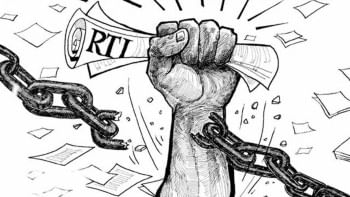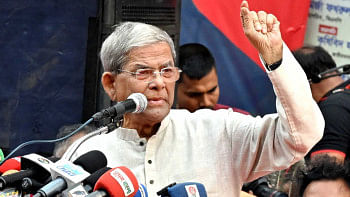Does RTI have a future in Bangladesh?

Readers often ask if we see a future for the Right to Information (RTI) Act in Bangladesh. Can public officials, long used to a deeply entrenched culture of official secrecy, ever become transparent in their work and feel accountable to citizens? Are there enough citizens who understand the full scope of the law and have the courage to use it to seek sensitive information or to expose any potential misdeeds?
The success and failure of any RTI law ride on three key players: citizens who must submit information requests, public authorities who must deal with them properly, and the Information Commission (IC) who must mediate disputes between the two sides impartially.
On average, about 10,000 people use RTI requests annually to seek information from public offices in Bangladesh. The numbers are admittedly small relative to our population, but given the nature of the law, they are not insignificant. Most of the requests, though, relate to matters of personal interest and/or information on mundane matters like government rules and regulations, for which RTI is not necessary. In other words, they do not pertain to transparency or accountability issues. This explains why the annual reports of the Information Commission show that over 95 percent of RTI applications in the country receive positive responses.
Except in a few cases, the law has hardly been used to probe government preparedness to disclose sensitive information on larger issues of national interest. Nor has it been used well enough to bring systemic change in governance. There is a clear reticence among citizens to use it for larger accountability issues: this could be due to fear of repercussions from the authorities, or mistrust of the Information Commission as an impartial arbiter, or even because most citizens are still unaware of the tremendous possibilities of the law.
Even on this level, progress is discernible. Though not many applications are made to unearth large-scale scandals on the national level, they are being made to probe many issues of a local nature. One NGO engaged in promoting the law in the north of the country has highlighted the many trials and tribulations of RTI users in rural or semi-urban areas. They reveal a generally cavalier attitude of public officials, many of whom still lack knowledge or understanding of some of the law's basic features and are often hostile towards applicants. These applicants, however, increasingly display a growing capacity to withstand pressure and hold their ground against bullying bureaucrats.
A common practice among Designated Officers – charged with dealing with RTI requests – is to insist that applicants provide mobile numbers in their requests. It enables them to call and chastise the applicant for daring to submit the request, browbeat them to withdraw it or threaten them with unpleasant consequences. Abhi Das, an RTI enthusiast in Dinajpur, had applied to the additional director of the local Department of Agricultural Extension office asking for information relating to the harassment of local farmers who sought to obtain government-approved agricultural equipment. An angry additional director reportedly dispatched his subordinate to the residence of the applicant to scold him for not providing the telephone number and ask him to pay a fee of Tk 2. Although intimidated, Abhi knew his RTI law: mobile phone numbers are not required and any demand for fees must be in writing.
In another example of how recalcitrant officials try to avoid their responsibility, Mominul Islam of Fulbari submitted an RTI request to the District Secondary Education Office asking for information on some irregularities at the school where he worked. Enraged by the application, the education officer served him with a show-cause notice for submitting such a complaint against the school. In his response, Mominul stated that he had not submitted any complaint against the school, but only a request for information.
In a very different story, 15 farmers from different upazilas in Dinajpur district each received a combine harvester, made by Kubota Corporation, at a subsidised price. The cost of Tk 30 lakh for each machine was to be shared half-and-half between the farmers and the government. The local Agriculture Office and the company personnel jointly provided training to the farmers, who were assured that the machines would be paid for within a few years because of cost-saving on agriculture production. The machines, however, became unusable within the first year. The farmers, who had each made a down payment of Tk 3-4 lakh and had agreed to pay the rest through instalments, were devastated. Soon, they received notices from the company for non-payment of instalments.
The farmers requested the Agriculture Office to investigate the matter, but the report of the investigation was not shared with them. So, they submitted an RTI request to the Agriculture Office on June 26, 2022. Receiving no response, they sought the help of a group of RTI activists in the district. Several members of the group soon submitted RTI requests to the same office asking for a copy of the report. On February 19, 2023, the director of the project sent the report to the Agriculture Office asking them to share it with the farmers. The report concluded in favour of the farmers and opined that it was inappropriate for the company to serve legal notices to the farmers directly, without informing the Agriculture Office first.
Farmers feed all of us, and the following story also bodes well for the future of RTI. Jamaluddin of Dinajpur's Nawabganj upazila submitted an RTI request to the local Agriculture Office asking for the list of farmers who had received incentive packages of seeds and fertiliser under a government scheme. Angered by the application, the official concerned sent his subordinate to the residence of the applicant asking why the application was made and who motivated them to do so. The applicant retorted that he had the right to seek information under the RTI Act and that the officer was duty-bound to respond. The berated official soon provided the list; his office even checked if others in the area were entitled to the incentive and, as a result, added 10 other farmers to the list.
To answer the question raised at the beginning of this article: we do see hope for the RTI Act in the country. But there are a few "ifs": if civil society pays more concerted attention; if the government brings disobedient officials to book; and if the Information Commission enhances its image as an impartial guardian of the law. With these conditions, all three key stakeholders of the law can be winners.
Dr Shamsul Bari and Ruhi Naz are chairman and assistant director (RTI), respectively, at Research Initiatives, Bangladesh (RIB).

 For all latest news, follow The Daily Star's Google News channel.
For all latest news, follow The Daily Star's Google News channel. 












Comments